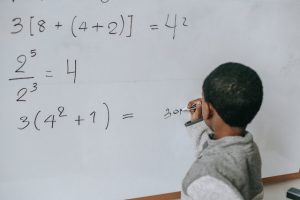
Preparing for Success: GCSE Math Mock Exams
GCSE math mock tests are essential for UK students. These practice tests allow students to examine their math knowledge and prepare for GCSE math exams. In this post, we’ll discuss GCSE math mock exam, their purpose, and how they might help students succeed academically.
Mock exams for GCSE maths?
Mock tests for GCSE math simulate the format and content of the actual exams. At the end of secondary school, UK students take these tests, usually around 16. These simulated tests familiarise students with the exam framework, test their math skills, and give them vital feedback.

- Knowledge Assessment: Mock exams let students test their math knowledge. They allow students to identify topic strengths and weaknesses and focus on areas that need improvement.
Mock tests assist students in preparing for GCSE math exams by mimicking their format and content. This familiarity decreases anxiety and promotes confidence, helping students perform well on tests.
- Feedback and improvement: Mock tests help students improve. By analysing their answers and understanding where they made mistakes, students can identify knowledge gaps and take proactive steps to improve. Teachers can use this feedback to personalise their lessons for specific students.
Benefits of GCSE Math Mock Exams:
- Identifying Knowledge Gaps: Mock tests assist students in identifying areas where they may be misinformed or confused. Early identification of knowledge gaps allows students to seek additional support or resources to improve their math ability.
- Enhancing Exam Technique: Mock tests allow you to practise time management, question analysis, and problem-solving. Pacing, time allocation, and question-type practice are available to students.
Confidence comes from familiarity. Mock examinations help students feel more confident and reduce exam anxiety. GCSE math exam performance improves with confidence.
- Refining Revision Strategies: Mock tests help students assess their revision methods. By analysing their performance and changing their study methods, students can optimise their revision strategies and allocate time to areas that need more attention.
Students can prepare for their final GCSE math exams via mock exams. They allow students to self-assess, improve, and have a realistic exam experience. Students can improve their math skills and identify their strengths and weaknesses by using mock tests. Use simulated tests to prepare for the real GCSE math exams, and remember that practice and patience are crucial to success.
Students prepare for final exams with GCSE math mock exams. Students’ skills and weaknesses are revealed by these practice exams.
Importance of GCSE Maths Mock Exams: Mock exams allow students to practise the structure, format, and content of the real exams. Confidence and a feeling of what to expect minimise worry. Students can also discover areas for development, reinforce concepts, and improve problem-solving skills using mock tests.

Effective GCSE Math Mock Exam Strategies:
- Understand the Exam Format: Understand the question types, marking scheme, and time allocation for each part. You’ll be able to manage your time better on the exam with this knowledge.
- Schedule your studies: Revision times and practice exams should be scheduled. Consistency leads to progress.
- Set a timer and take full-length mock examinations to simulate exam conditions. Answering questions will be faster and more accurate.
- Analyse Your Performance: After each mock exam, examine your answers and identify strengths and weaknesses. To improve your understanding, pay attention to repeating mistakes and seek advice.
- Ask for Feedback: Ask your math teacher or tutor for mock exam feedback. They can provide significant insights, identify improvement areas, and provide supplemental study resources.
Tips to Ace GCSE Maths Mock Exams:
Revisit Algebra, Geometry, and Statistics: Review fundamentals to build a strong foundation. You can confidently solve harder problems by strengthening the basics.
Practise Past Papers: Familiarise yourself with GCSE maths exam problems. It will help you spot trends and learn a variety of problem-solving methods.
Problem-Solving Skills: Learn to solve problems by breaking them down, using diagrams, and employing logic. Use these methods in mock exams to improve your problem-solving.
Time management is essential during exams. Based on complexity, give each question enough time. Move on if you get stuck and return to it later.
Use Mistakes to Learn: Use mock examinations to learn from mistakes. Each wrong answer illuminates areas for development. Take advantage of these learning opportunities and alter your study habits.
Mock tests for GCSE maths help prepare students for final exams. Students can build confidence, improve their skills, and perform at their best by using effective tactics, practising, and accepting feedback. Treat practise tests as learning opportunities, and you’ll be ready to tackle your GCSE maths challenges.
GCSE math mock tests help students prepare for the real thing. In these practice assessments, students will make blunders. However, these blunders should be considered learning opportunities rather than failures. In this post, we’ll examine GCSE math mock exam faults, their causes, and ways to improve performance.
Mistakes are essential to learning. They help focus future research on areas that need more study. Students might improve their GCSE math performance by accepting mistakes in practice exams.

Common GCSE Math Mock Exam Errors:
Misreading Questions: One of the most prevalent blunders is misinterpreting the question, resulting in inaccurate answers. Before answering, students must carefully study the questions, paying attention to keywords and prerequisites.
Calculation errors: Even a tiny error in math calculations can result in an inaccurate answer. Basic arithmetic errors like addition, subtraction, multiplication, and division can cascade throughout the problem. To avoid these errors, pay close attention and double-check computations.
Lack of Methodical Approach: Rushing through problems without a methodical approach typically causes blunders. To ensure accuracy and clarity, students should prepare their solutions, break down complex problems into simple parts, and organise their work.
Incomplete Working: Sometimes, students answer without exhibiting their work or discussing their solution. This omission can cost points even if the final answer is correct. Demonstrating mental processes and comprehensive working is essential to show knowledge.
Misuse of Formulas and Concepts: Applying wrong formulas or misinterpreting essential concepts can result in inaccurate answers. To avoid these blunders, students should review and practise the proper formulas and understand the underlying ideas.
Mistakes in GCSE math mock tests are opportunities to improve. Students can improve their understanding, problem-solving skills, and exam scores by recognising and analysing these errors. Accept mistakes as learning opportunities and use them to succeed in GCSE math. Remember that success is characterised by the ability to learn from mistakes and improve.






